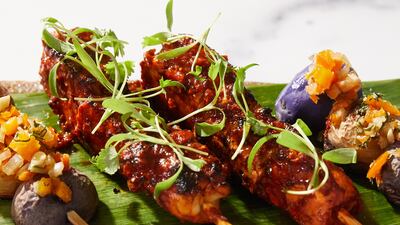Lab-grown meat is a rising trend among those looking to reduce their carbon footprint.
For Muslims looking to live a more environmentally friendly lifestyle, however, a big question is whether or not it is halal.
So - is it?
The short answer, according to some Muslim scholars, is yes, but it depends.
What is lab-grown meant?
“Cultivated meat is real meat without the need to slaughter an animal,” said Josh Tetrick – chief executive and co-founder of Eat Just, the first company in the world to receive approval to sell such a product.
The company was established in 2011, and in 2020, it was the first in the world to receive approval to sell cultivated meats.
Last year, it received approval from both the Food and Drug Administration and the Department of Agriculture to sell its products in the US.
Curious diners can taste Eat Just's lab-grown meat products at a Washington restaurant owned by renowned chef and humanitarian Jose Andres.
In order to “grow meat”, material as small as a cell is extracted from an animal. It is then placed in a nutrient bath to encourage it to grow and reproduce.
The cells are then “coaxed” to differentiate into mature muscle or fat and bind into fibres, according to the journal Nature.
After a couple of weeks, edible tissue develops and it can be cooked and consumed like normal meat.
Cultivated meat has fewer carbon emissions and is much less prone to diseases commonly carried in regular meat, like E coli.
Eat Just and companies like it believe that cultivated meat will be the new normal when it comes to consuming animal-based proteins.
Singapore became the first country to allow the selling of lab-cultivated meat in 2020, though the products are currently sold in limited quantities as Eat Just - currently the only company permitted to sell the product in the country - does not have mass production capabilities as yet.
Is lab-grown meat halal?
Farhan Siddiqi, a graduate of Makkah's Umm Al Qura University and the imam of Dar Al Hijra Islamic centre in the US state of Virginia, said that lab-grown meat can be halal if certain conditions are met.
“Lab-cultivated meat can be halal if the cell being cultivated is from the cow [or other animal] that has been slaughtered in accordance with Islamic law,” he told The National.
For meat to be considered halal, it must meet a variety of requirements that include ensuring humane slaughter, the draining of all blood and the good health of the animal before it is killed.
Mr Tetrick, recognising the importance of not excluding the world's two billion Muslims, consulted with three Muslim scholars whose views coincided with Imam Siddiqi: cultivated meat is halal as long as the cells are harvested in a way that complies with Islamic standards.
It may sound like a waste to slaughter an animal just to obtain its cells, but from one animal, the company can create more halal and environmentally friendly meat without needing a whole herd to be slaughtered.
Eat Just plans to introduce and promote its products in the Middle East, a market which they believe has a lot of potential.
“Countries in the Mena [Middle East and North Africa] region, such as Saudi Arabia, UAE, Qatar and Kuwait, have large young populations in areas where food security is a real significant issue,” Mr Tetrick explained.
He added that countries in Mena export 90 per cent of their meat, but that does not have to be the case.
It is possible that countries across the Mena region could “build up an infrastructure of innovation that they are eventually exporting across Europe and the rest of the world”, he said.














